
- Home
- India
- World
- Premium
- THE FEDERAL SPECIAL
- Analysis
- States
- Perspective
- Videos
- Sports
- Education
- Entertainment
- Elections
- Features
- Health
- Business
- Series
- In memoriam: Sheikh Mujibur Rahman
- Bishnoi's Men
- NEET TANGLE
- Economy Series
- Earth Day
- Kashmir’s Frozen Turbulence
- India@75
- The legend of Ramjanmabhoomi
- Liberalisation@30
- How to tame a dragon
- Celebrating biodiversity
- Farm Matters
- 50 days of solitude
- Bringing Migrants Home
- Budget 2020
- Jharkhand Votes
- The Federal Investigates
- The Federal Impact
- Vanishing Sand
- Gandhi @ 150
- Andhra Today
- Field report
- Operation Gulmarg
- Pandemic @1 Mn in India
- The Federal Year-End
- The Zero Year
- Science
- Brand studio
- Newsletter
- Elections 2024
- Events
- Home
- IndiaIndia
- World
- Analysis
- StatesStates
- PerspectivePerspective
- VideosVideos
- Sports
- Education
- Entertainment
- ElectionsElections
- Features
- Health
- BusinessBusiness
- Premium
- Loading...
Premium - Events
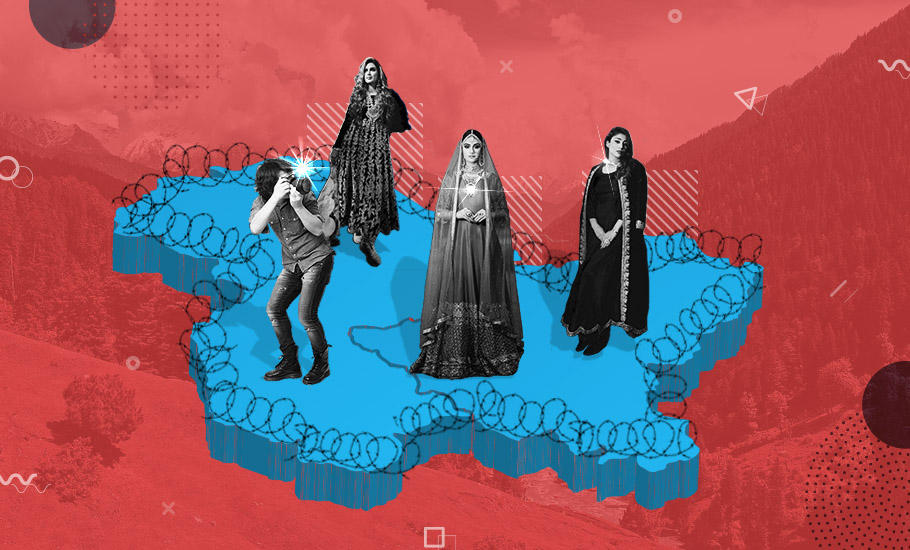
Ethnic fashion: Kashmir's young make way amid political uncertainties
A good number of Kashmiri youths are part of the fledgling fashion industry that promote ethnic traditions, clothing lines, tourism spots and jewellery brands.

As the season’s first snowfall carpeted Kashmir this winter, Ronak left for the outskirts of Srinagar. She was planning to shoot a music album there. “I wanted to be captured in the backdrop of the virgin snow-draped plains, bereft of human footprints or traces,” says Ronak, in an ebullient voice. In her early 20s, Ronak has been into modelling since 2017. The passion started when...
As the season’s first snowfall carpeted Kashmir this winter, Ronak left for the outskirts of Srinagar. She was planning to shoot a music album there.
“I wanted to be captured in the backdrop of the virgin snow-draped plains, bereft of human footprints or traces,” says Ronak, in an ebullient voice.
In her early 20s, Ronak has been into modelling since 2017. The passion started when her candid pictures got an overwhelming response on Instagram.
“I have so far received a good response from netizens back home,” she says. What also works in her favour, she says, is that nobody questions her choice of career much, something unthinkable for girls in Kashmir till a few years back.
Ronak says her parents’ support made all the difference. “I don’t really care what others think about me. Both I and my family know that I am doing nothing wrong by living my dream.”
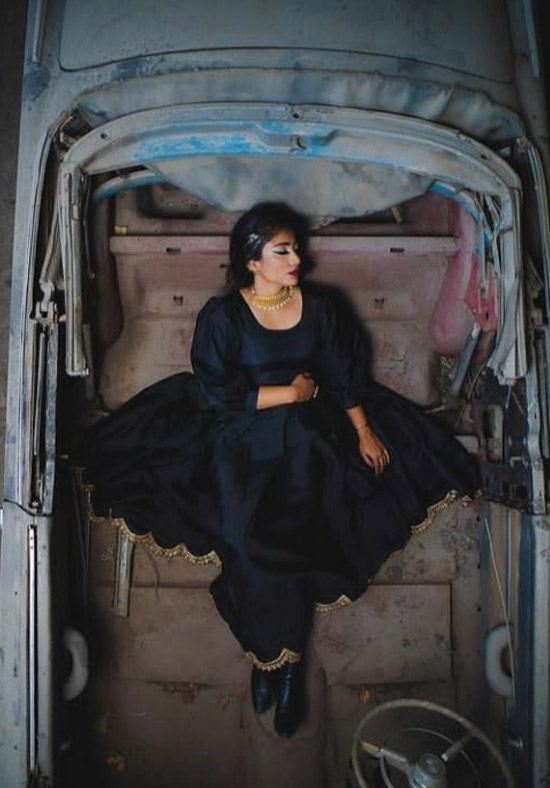
Creative pursuits—like modeling—are yet to come of age in Kashmir’s traditional society. Ronak has however become a pioneer for aspiring young girls who plan a career in modelling.
The same spirit is now helping her broaden her creative canvas. Ronak has now become part of the fledgling fashion industry of Kashmir that comprises an expanded sector of photographers, makeup artists, outfit designers and models who are now collaborating to promote ethnic traditions, clothing lines, tourism spots and jewellery brands.
Some of them have even got exciting and expensive contracts for cinematic weddings in the Valley from clients within the Union Territory and outside.
Back in 2018, locals engaged in the niche wedding industry contacted Ronak for promotional shoots. Her first professional photo-shoot that year was with a makeup artiste showcasing a bridal collection. There was no looking back again. “Contracts kept coming from makeup artists, jewellery and outfit designers for bridal shoots,” she says.
But unlike Ronak, a Pulwama boy, Shahid Rashool Bhat calls his modelling and designing career a tightrope walk in strife-ridden Kashmir.
Sporting a long hairdo and beard, Bhat became the first person in Kashmir to organise a fashion show in Srinagar’s DPS School in 2019. The show was dedicated to the artisans and handlooms of the Valley.
“In an uncertain place called Kashmir, people still seek security in government jobs,” Bhat says. “For example, I may be designing the best clothes and catering to clients across India, but my family or relatives still wonder about my future.”
But that traditional mindset leaning towards a stable government sector profession is no longer bothering Kashmir’s new-age creative movers and shakers. As self-starters, they heavily rely on collaborations—a trend fuelling the fledgling fashion industry and cinematic weddings.
These creative collaborations work on barter systems where each stakeholder brings in talent, brand, commodity, infrastructure or helps with logistics to create an end product for the market, which is mostly advertised online.
They attract business for themselves and in turn refer each other for related projects, and earn handsomely from it. Despite hitches and hiccups in the politically-uncertain Valley, many of them have managed sizable followers and audiences on several social media platforms.
One such collaborator in this emerging sector in Kashmir is Iqra, whose clothing line Tulpalav is quite popular among women in Kashmir. She also caters to Bollywood actresses, such as Soni Razdan.
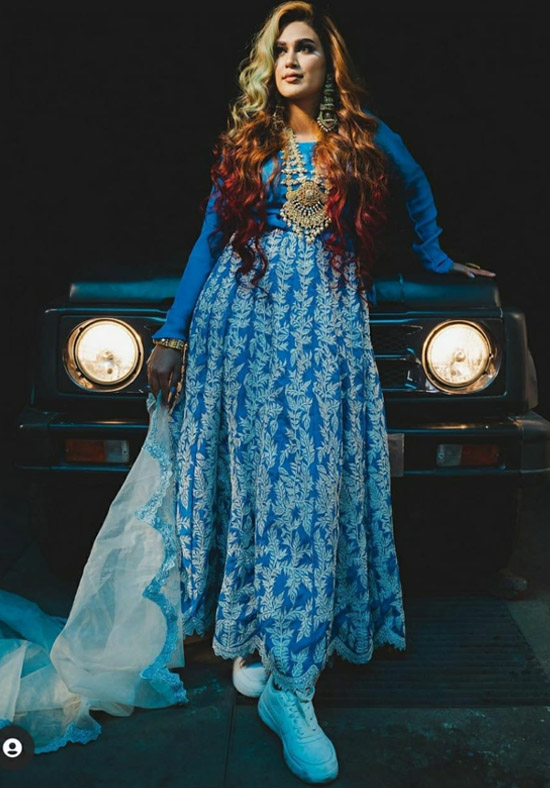
“I met Razdan on the sets of a music video shoot called Yamberzal, for which I was a costume designer,” says Iqra. The actress liked the outfit so much that she ordered some outfits for herself and friends in Mumbai.
Iqra’s designs contextualise the mood of any particular situation and add to the emotions even as she attempts to weave in cultural and traditional themes as well.
Since she mostly works in various partnership projects like modelling shoots, music video albums and short films, her outfits have now started reaching lakhs of followers through several social media influencers.
“This artistic alliance has increased my followers and it simultaneously challenged my design creativity,” says Iqra.
Back in 2015, when Iqra started Tulpalav, she would just click a simple picture of her design on a mannequin or a hanger and upload it on Instagram. But now, she says, everything has changed and competition is getting tougher. But her passion faces the domestic and political hassles.
After the Centre abrogated Jammu and Kashmir’s semi-autonomous status and imposed a months-long lockdown since August 5, 2019, her venture nosedived amid logistical and communication restrictions.
“The entire operation came to a grinding halt,” she recalls. “Even getting in touch with a team member, sending a parcel to a customer or simply uploading a picture or video became daunting.”
In such an uncertain scenario, being a cameraman is even tougher. And Ruman Hamdani knows that only too well.
This engineer-turned-filmmaker is known for shooting commercials, short videos and music albums. His production house Master Visuals Studio is actively shooting cinematic weddings in the Valley.
Ruman believes artistic teamwork provides room to showcase creativity to a wider audience with greater response and impact.
“When we shoot a wedding,” he says, “we have to use limited light and space and work according to the client’s tastes and interests.” This, he says, puts a limit to one’s abilities and art.
But when they showcase their work through collaborations, including new themes, lighting and sets, it opens the doors for and attracts new projects. After seeing these videos and photos even brides are ready to experiment with the designs, costume, colours and photography, enhancing the scope of business.
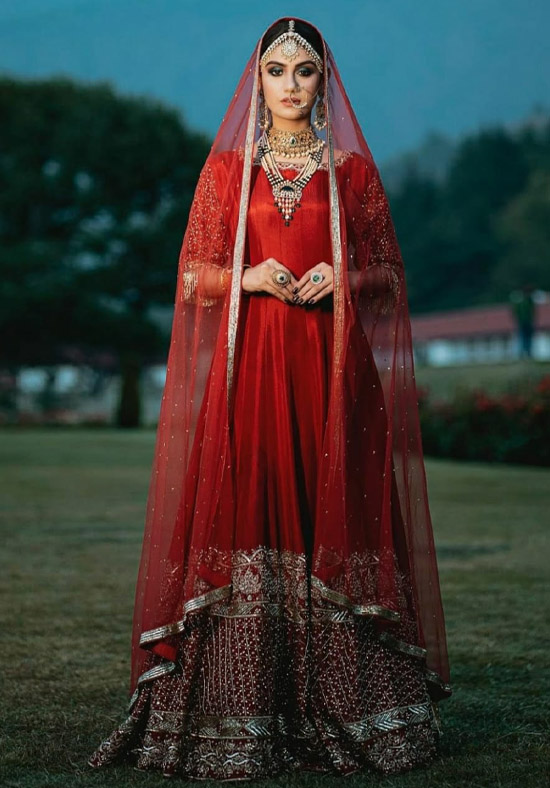
But then again, working in a politically-sensitive place brings its own risks, he says.
“Whenever we use our drone cameras, we have to first check whether the area is under security control or not,” Ruman says. “We have to seek permission from authorities even for a promotional shoot.”
He reminisces that once, while doing a wedding-shoot near Srinagar Airport road, they had to drop the idea of shooting with a drone camera as they were told that even the road leading to the airport was a ‘no-fly zone’. “Our client was unhappy about it,” he rues.
However, rising above such situational difficulties, many creative youngsters are slogging their way to create a distinct identity for the Valley.
Not to lose out in this race was Kashmir’s 175-year-old jeweller family, Tara Singh Jewellers by Gurnain Singh and Gurtegh Singh.
“We felt that the time has come to promote our jewellery through artistic grouping,” says Manveet Kaur, a daughter-in-law in the family of the famous jewellers. “As the competition increased in the market, it was high time to promote and reach our customers by linking ourselves with the new fashion industry.”
Connecting with their clients through the virtual medium was a clear departure from their brand building efforts of yesteryears.
Recently, Manveet organised a photo-shoot themed as ‘Nazaakat-e-Zewar’ for which she hired a top model at a posh hotel in Kashmir.
“We took some photos in the Maharaja suite of the hotel,” she says. “We received quite good responses from people and our orders also increased.”
Cinematic weddings have created a huge market for Tara Singh Jewellers, who’s getting orders from brides after watching their advertising content on social media.
“Brides now demand the whole look for their weddings after seeing photographs which we take during collaboration work,” says Manveet.
A key part of this is the makeup artiste, who helps the bride get the final look for the shoot.
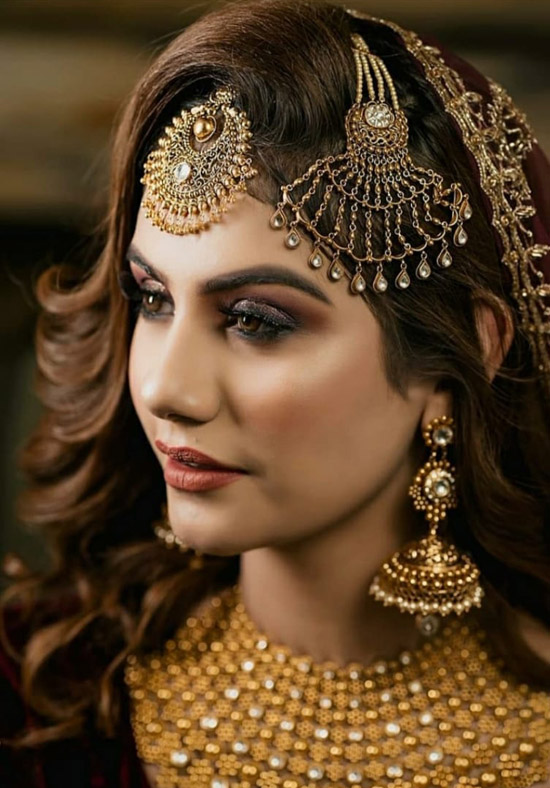
Sabina, a leading makeup artiste of Valley, says things have opened up in what was largely considered a conservative society.
“Kashmir society is conservative only when it comes to maintaining their cultural heritage, rest people are adoptive in modernity which does not impact their culture,” she says.
“People here have the potential to spend and they organise lavish weddings as the wedding is one of the core life goals for a Kashmiri,” she observes.
After doing a makeup artistry course from Beauty Academy London and bridal makeup specialization from London Makeup School, she went for traditional advertisements on radio and newspapers.
Sabina too had to struggle to reach out to her clients, mostly brides, during the lockdown and extended communication restriction period, as it was the prime autumn wedding season in Kashmir.
“I was pre-booked for two months when the abrogation of Article 370 plunged us into a communication crisis,” she says.
She just worked on clues and had to negotiate the barricades and hassles of security forces to reach some brides, who needed her desperately on their big days.
“After all, it was the best day of their lives,” she says. “But in Kashmir, the best days can often turn into horrible memories.”
